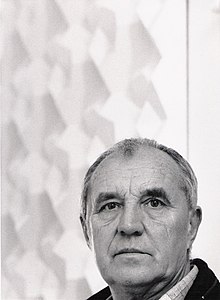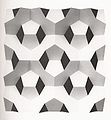
Ed Gebski is an artist from Amsterdam. His monumental canvasses are created in a darkroom where he works with silver-nitrate/oil paint. Only when the paintings are exposed to light do they reveal their colour and presentation. This process is akin to the development of photographs. The paint emulsion is removed after the painting process and then transparent colours remain on the canvas.

The Bonnefanten Museum is a museum of fine art in Maastricht, Netherlands.
Carel Balth was a Dutch artist and curator.
The Museum Card is a personal card that allows subscribers free entry to about 400 museums in the Netherlands. The card is valid for one year. In 2013, there were more than 900,000 cardholders. In 2011, over 23% of visitors to the affiliated museums had Museum Cards.
Niek Kemps is a Dutch visual artist and lives and works in Amsterdam and Wenduine, Belgium.
Hubert-Jan Henket is a Dutch architect. He is a specialist in the relations between old and new buildings, the redesign of buildings, renovation and restoration. He is the founder of DOCOMOMO international.
René Daniëls is a Dutch artist.

Han Schuil is a Dutch multimedia artist, who works in a Dutch tradition of compactness and tension in painting.

Pieter Abramsen was a Dutch sculptor, and visiting professor at the Delft University of Technology, known for his work in which abstraction and realism are joined.

Johannes Jacobus (Jan) van der Vaart was an influential Dutch ceramist from the 20th century, known as founder of the abstract-geometric ceramics in the Netherlands.

Dora Dolz de Herman was a Spanish-Dutch artist, best known for her ceramic outdoors in the form of chairs and sofas.
Teunis (Teun) Jacob was a Dutch wall painter and sculptor, who lived and worked in Rotterdam since the early 1950s. He made both figure and nonrepresentational art.
Daniël (Daan) van Golden was a Dutch artist, who has been active as a painter, photographer, collagist, installation artist, wall painter and graphic artist. He is known for his meticulous paintings of motives and details of everyday life and every day images.
Axel Erik van der Kraan is a Dutch sculptor, performance artist and graphic artist, also known with Helena van der Kraan as Axel and Helena van der Kraan.
Juul Kraijer is a Dutch visual artist. Her work has been exhibited internationally, and is included in major museum collections such as the Museum of Modern Art, New York City, the Museum of Old and New Art, Tasmania and the Kupferstichkabinett Berlin.

Hendrik Everhart (Henk) Tas is a Dutch visual artist, working as a sculptor, photographer, graphic artist, and wall painter.
Piet Gerards is a Dutch graphic designer and publisher.

Henri Ritzen was a Dutch painter. He is chiefly known for painting landscapes and religious scenes.

Charles Hubert Eyck was a Dutch visual artist. Together with Henri Jonas and Joep Nicolas, he was a pioneer of the so-called Limburg School.












